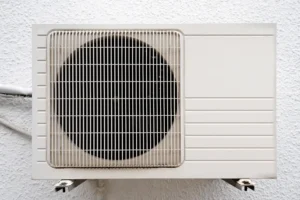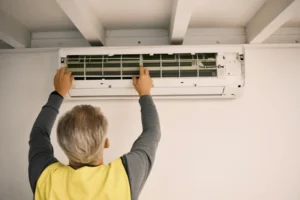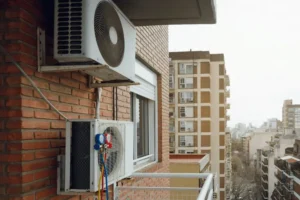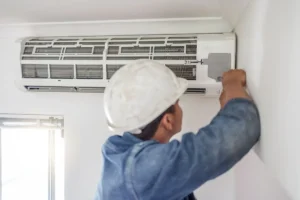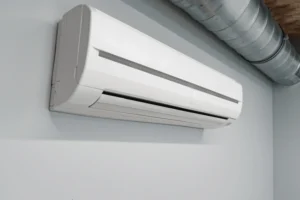
Installing a ducted heat pump in Ottawa has become increasingly popular due to its energy efficiency, ability to provide year-round comfort, and the long-term cost savings it offers. Unlike traditional heating and cooling systems, ducted heat pumps can both heat and cool your home using a single system, leveraging electricity in a highly efficient manner.
For homeowners in Ottawa, understanding the average costs, influencing factors, available rebates, installation process, and maintenance requirements is essential before committing to this investment. This article provides a comprehensive guide backed by current industry insights, helping homeowners make informed decisions.
Understanding Ducted Heat Pumps
A ducted heat pump is a centralized HVAC system that distributes heated or cooled air through ductwork installed throughout a home. The system consists of:
- Outdoor Unit: Extracts heat from the outside air even during cold temperatures.
- Indoor Unit: Circulates conditioned air throughout the home via ductwork.
Key Advantages of Ducted Heat Pumps
- Energy Efficiency: Modern heat pumps can produce 3–4 units of heat for every unit of electricity consumed, significantly lowering energy bills.
- Year-Round Comfort: These systems provide both heating in winter and cooling in summer.
- Low Carbon Footprint: By reducing reliance on natural gas or oil, heat pumps lower greenhouse gas emissions.
- Integration with Smart Home Systems: Many models are compatible with smart thermostats, remote control apps, and zoning systems for precise temperature control.
By choosing a ducted system, homeowners enjoy a consistent and comfortable indoor climate, unlike portable units or window air conditioners that only target specific areas.
Average Installation Costs in Ottawa
The cost of installing a ducted heat pump in Ottawa varies depending on factors such as system type, home size, efficiency rating, and ductwork requirements. Based on current market research, the typical price range is:
| Component | Average Cost (CAD) |
| Small single-zone system | $6,000 – $9,000 |
| Mid-sized multi-zone system | $9,000 – $12,000 |
| Large multi-zone or high-efficiency system | $12,000 – $16,000 |
| Additional ductwork installation | $1,500 – $3,000 |
| Electrical panel upgrade (if needed) | $1,000 – $2,500 |
Key Takeaways
- Homes with existing ductwork usually face lower installation costs.
- Cold-climate heat pumps optimized for Ottawa winters may cost slightly more but offer superior efficiency in extreme temperatures.
- Multi-zone systems, which allow independent temperature control in different rooms, will increase the overall price but provide better comfort.
Factors Influencing Installation Costs
Several key elements determine the total installation cost:
- System Type: Ducted versus multi-split or zoned systems. Multi-zone systems are more expensive but allow better room-by-room temperature control.
- Home Size: Larger homes require higher-capacity units, increasing equipment and labor costs.
- Efficiency Rating: Units with higher SEER (Seasonal Energy Efficiency Ratio) and HSPF (Heating Seasonal Performance Factor) ratings cost more initially but save money in the long term.
- Electrical Requirements: Older homes may require panel upgrades to support the new system, adding to costs.
- Ductwork Installation or Upgrades: Installing or modifying ducts can be expensive, especially in homes without existing duct infrastructure.
- Location and Labor: Labor costs can vary depending on accessibility, complexity of the home layout, and local contractor rates.
Cost Breakdown Example
For a typical Ottawa home of 2,000 square feet:
| Item | Estimated Cost |
| Ducted Heat Pump System | $10,500 |
| Ductwork Modifications | $2,000 |
| Electrical Upgrades | $1,500 |
| Total Installation Cost | $14,000 |
This example illustrates that costs can fluctuate based on home-specific requirements and system selection.
Rebates and Incentives
Ottawa homeowners can benefit from multiple rebate programs that help reduce the upfront cost of ducted heat pump installation:
- Canada Greener Homes Grant: Offers up to $5,000 for eligible heat pump installations.
- Enbridge Gas Rebates: Provides incentives for energy-efficient home upgrades.
- Manufacturer Promotions: Some brands offer seasonal discounts or package deals.
These rebates and promotions can significantly lower the net cost, making the investment more affordable. Homeowners are advised to apply early, as funds may be limited and competitive.
Financing Options
Even with rebates, installing a ducted heat pump represents a substantial investment. Homeowners can explore various financing options to spread costs over time:
- Home Equity Loans: Borrow against the equity of your home to fund installation.
- Low-Interest Financing from Contractors: Many contractors partner with financial institutions to provide in-house financing.
- Government-Backed Loans: Programs such as the Canada Greener Homes Loan offer low-interest financing for energy-efficient upgrades.
Financing allows homeowners to enjoy the immediate benefits of a new heat pump without a heavy upfront expenditure.
Installation Process
Professional installation is essential to ensure the system operates efficiently and meets warranty requirements. A typical installation process includes:
- Initial Consultation and Site Assessment: Technicians assess your home’s size, insulation, ductwork, and electrical system.
- System Selection: Choosing the right unit size and efficiency rating for your home.
- Ductwork Modifications: Installing or modifying ducts as needed.
- Unit Installation: Outdoor and indoor units are installed and connected.
- Electrical Connections: The system is integrated with your home’s electrical panel.
- Testing and Commissioning: Technicians test the system for performance, airflow, and efficiency.
The installation typically takes 1–3 days for standard homes but may take longer for more complex setups, such as multi-zone systems or homes with extensive duct modifications.
Long-Term Benefits and Savings
While ducted heat pumps require a higher initial investment compared to traditional HVAC systems, the long-term savings and benefits are substantial:
- Reduced Energy Bills: Heat pumps can be up to four times more efficient than gas or electric systems.
- Lower Maintenance Costs: With fewer moving parts than furnaces or boilers, heat pumps generally require less frequent maintenance.
- Dual Functionality: A single system provides both heating and cooling, eliminating the need for separate appliances.
- Increased Home Value: Homes with modern, energy-efficient HVAC systems are often more attractive to buyers.
Energy Savings Example
| Heating System | Annual Energy Cost (CAD) | Notes |
| Gas Furnace | $2,200 | Higher fuel cost during winter |
| Electric Baseboard | $2,500 | Less efficient in large homes |
| Ducted Heat Pump | $900 – $1,200 | Efficient, provides cooling as well |
This table illustrates how ducted heat pumps can provide substantial savings compared to traditional heating methods.
Maintenance and Lifespan
To ensure that your ducted heat pump continues to operate at peak performance for many years, routine maintenance is absolutely essential. Like any other major home system, neglecting care can lead to reduced efficiency, higher energy bills, and unexpected repair costs.
- Filter Cleaning or Replacement: The air filter plays a critical role in maintaining indoor air quality and protecting the system from dust and debris. Depending on usage and household conditions (such as pets or allergies), filters should be cleaned or replaced every 1–3 months. A clean filter allows for smoother airflow and reduces strain on the unit.
- Annual Professional Inspection: At least once a year, a certified technician should inspect the system. This visit typically includes checking refrigerant levels, testing airflow, inspecting ductwork, calibrating thermostats, and ensuring that all electrical connections are secure. A preventative inspection can identify small issues before they become expensive repairs.
- Duct Cleaning: Since ducted systems rely on a network of ducts to distribute air, it’s important to keep them clear of dust and debris. Professional duct cleaning every 3–5 years is recommended to maintain both efficiency and healthy indoor air quality.
With consistent upkeep, a high-quality ducted heat pump can last 15 to 20 years, providing dependable comfort and maximizing your return on investment.
Choosing the Right Contractor
Selecting a reputable contractor is just as important as choosing the right heat pump system. A poor installation can undermine efficiency, shorten system lifespan, and even void manufacturer warranties. To safeguard your investment, keep the following in mind:
- Check Licensing and Certification: Ensure the installer holds proper credentials to perform HVAC work in Ontario and has experience with ducted heat pumps.
- Ask for References: Speaking to past clients can provide valuable insights into the contractor’s professionalism, reliability, and quality of work.
- Compare Quotes: Gather at least three estimates to get a sense of fair pricing and avoid being overcharged.
- Review Warranty Options: Confirm that both the equipment and installation labor are covered under warranty.
A trustworthy contractor not only ensures a smooth installation but also provides peace of mind knowing your system will operate efficiently for years.
FAQs
What is the average cost of ducted heat pump installation in Ottawa?
The average cost ranges from $6,000 to $16,000, depending on system type, home size, and ductwork requirements.
Are there rebates available for heat pump installations in Ottawa?
Yes, federal and provincial programs like the Canada Greener Homes Grant and Enbridge rebates can help reduce installation costs.
How long does it take to install a ducted heat pump?
Installation usually takes 1–3 days depending on system size and home complexity.
What factors influence the cost of a heat pump installation?
Cost depends on system type, home size, efficiency rating, ductwork, and any electrical upgrades needed.
Are heat pumps effective in Ottawa’s cold winters?
Yes, cold-climate heat pumps are designed to operate efficiently even in temperatures below -20°C.
Final Thoughts
Investing in a ducted heat pump in Ottawa is a smart choice for homeowners seeking energy efficiency, comfort, and long-term savings. While installation costs may seem high initially, available rebates, financing options, and long-term energy savings make it financially and environmentally responsible.


